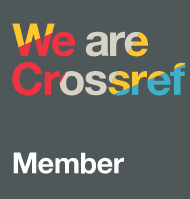The Correlation between Reading Strategies and Reading Comprehension
Abstract
Keywords
Full Text:
PDFReferences
Alharbi, M. A. (2015). Reading strategies, learning styles and reading comprehension: A correlation study. Journal of Language Teaching and Research, 6(6), 1257–1268. https://doi.org/10.17507/jltr.0606.13
Amir, A., Hasanuddin, W. S., & Atmazaki. (2019). The contributions of reading strategies and reading frequencies toward students’ reading comprehension skill in higher education. International Journal of Engineering and Advanced Technology, 8(6 Special Issue 3), 593–597. https://doi.org/10.35940/ijeat.F1105.0986S319
Arguedo, A., Cabiladas, R., Minoza, J., Nidoy, C. P., & Moneva, J. (2023). Reading comprehension factors and performance of EFL secondary students in Thai education landscapes: A multi-regression analysis. Journal of English Education, 9(2), 2023. https://doi.org/10.30606/jee.v9i2
Banditvilai, C. (2020). The effectiveness of reading strategies in reading comprehension. International Journal of Social Science and Humanity, 10(2), 46–50.
Bećirovic, S., Brdarević-Čeljo, A., & Sinanović, J. (2017). The use of metacognitive reading strategies among students at International Burch University: A case study. European Journal of Contemporary Education, 6(4), 645–655. https://doi.org/10.13187/ejced.2017.4.645
Boonmoh, A., & Tuaynak, A. (2023). An exploration of explicit teaching of reading with Thai students of low EFL proficiency: Factors affecting reading comprehension. Kasetsart Journal of Social Sciences, 44(4), 1061–1070. https://doi.org/10.34044/j.kjss.2023.44.4.10
Brown, H. D., & Abeywickrama, P. (2019). Language assessment: The principles and classroom practices (3rd ed.). Pearson.
Creswell, J. W., & Creswell, J. D. (2018). Research Design: qualitative, quantitative, and Mixed methods approaches (5th ed.). Sage.
Ferraz, A. S., Pinheiro, M. C., Angeli, A. A., & Santos, D. (2021). Motivation and Strategies for Reading Comprehension in Middle School Amanda Lays Monteiro Inácio. Revista Colombiana de Psicología, 30(2), 71–86. https://doi.org/10.15446/rcp.v30n2
Flavell, J. H. (1979). Metacognition and Cognitive Monitoring A New Area of Cognitive-Developmental Inquiry A Model of Cognitive Monitoring. American Psychologist, 34(10), 906–911.
Gönen, İ. K. (2015). The relationship between FL reading strategies and FL reading proficiency: A study on Turkish EFL learners. Educational Research and Reviews, 10(24), 2924–2936. https://doi.org/10.5897/err2015.2530
Grabe, William, Stoller, & Fredricka L. (2002). Teaching and Researching: Reading (2nd ed.). Pearson Education.
Hasani, A., & Pahamzah, J. (2022). Relationship Approach to Cognitive and Metacognitive Strategies on EFL Students’ Reading Comprehension. Eurasian Journal of Applied Linguistics, 8(2), 16–23. https://doi.org/10.32601/ejal.911537
Kassem, H. M., & Alqahtani, D. A. (2023). Motivation, Strategy Use, and Comprehension in Foreign Language Reading: The Case of Saudi EFL Learners at the Preparatory Year. Journal of Language Teaching and Research, 14(5), 1290–1301. https://doi.org/10.17507/jltr.1405.17
Komiyana, R. (2009). CAR: A means for motivating students to read. English Teaching Forum, 3, 32–37.
Kyung Ja Kim. (2015). Developing a Structural Model of EFL Reading Achievement for Korean High School Students. English Teaching, 70(3), 3–21. https://doi.org/10.15858/engtea.70.3.201509.3
Maeng, U. (2014). The Effectiveness of Reading Strategy Instruction: A Meta-Analysis. English Teaching, 69(3), 105–127.
Mirzaei, A., Rahimi Domakani, M., & Heidari, N. (2014). Exploring the relationship between reading strategy use and multiple intelligences among successful L2 readers. Educational Psychology, 34(2), 208–230. https://doi.org/10.1080/01443410.2013.785053
Mokhtari, K., & Sheorey, R. (2002). Measuring ESL students’ awareness of reading strategies. Journal of Development Education, 25(3), 2–10. https://www.researchgate.net/publication/285641803
Ondé, D., Jiménez, V., Alvarado, J. M., & Gràcia, M. (2022). Analysis of the Structural Validity of the Reduced Version of Metacognitive Awareness of Reading Strategies Inventory. Frontiers in Psychology, 13. https://doi.org/10.3389/fpsyg.2022.894327
Ortega-Ruipérez, B. (2022). The Role of Metacognitive Strategies in Blended Learning: Study Habits and Reading Comprehension. RIED-Revista Iberoamericana de Educacion a Distancia, 25(2), 219–238. https://doi.org/10.5944/ried.25.2.32056
Oxford, R. L., & Burry-Stock, J. A. (1995). Assessing the use of language learning strategies worldwide with the ESL/EFL version of the strategy inventory for language learning (SILL). System, 23(I), 1–23.
Par, L. (2020). The relationship between reading strategies and reading achievement of the EFL students. International Journal of Instruction, 13(2), 223–238. https://doi.org/10.29333/iji.2020.13216a
Qanwal, S., & Karim, S. (2014). Identifying correlation between reading strategies instruction and l2 text comprehension. Journal of Language Teaching and Research, 5(5), 1019–1032. https://doi.org/10.4304/jltr.5.5.1019-1032
Sheorey, R., & Mokhtari, K. (2001). Differences in the metacognitive awareness of reading strategies among native and non-native readers. System, 29(2001), 431–449. www.elsevier.com/locate/system
Sun, Y., Wang, J., Dong, Y., Zheng, H., Yang, J., Zhao, Y., & Dong, W. (2021). The Relationship Between Reading Strategy and Reading Comprehension: A Meta-Analysis. In Frontiers in Psychology (Vol. 12). Frontiers Media S.A. https://doi.org/10.3389/fpsyg.2021.635289
Sung, D., & McNeil, L. (2019). Professional Development Experiences in Reading Comprehension Instruction. The Asian TEFL Journal, 3(21), 72–104.
Taladngoen, U., Palawatwichai, N., Esteban, R. H., & Phuphawan, N. (2020). A Study of Factors Affecting EFL Tertiary Students’ Reading Comprehension Ability. Rangsit Journal of Educational Studies, 7(1), 12–21. https://www.researchgate.net/publication/342511230
Westwood, P. S. (2008). What teachers need to know about reading and writing difficulties (C. Glascodine, Ed.; 1st ed.). ACER Press.
Yapp, D., de Graaff, R., & van den Bergh, H. (2023). Effects of reading strategy instruction in English as a second language on students’ academic reading comprehension. Language Teaching Research, 27(6), 1456–1479. https://doi.org/10.1177/1362168820985236
Zhang, L., & Seepho, S. (2013). Metacognitive Strategy Use and Academic Reading Achievement: Insights from a Chinese Context. In Electronic Journal of Foreign Language Teaching (Vol. 10, Issue 1). http://e-flt.nus.edu.sg/
Zhang, L., & Sukying, A. (2022). THE RELATIONSHIPS BETWEEN COGNITIVE AND METACOGNITIVE STRATEGIES AND EFL READING TEST PERFORMANCE OF THAI UNIVERSITY LEARNERS. European Journal of Education Studies, 9(7). https://doi.org/10.46827/ejes.v9i7.4364
DOI: https://doi.org/10.33373/chypend.v9i2.5975
Refbacks
- There are currently no refbacks.

This work is licensed under a Creative Commons Attribution-NonCommercial-ShareAlike 4.0 International License.
Copyright (c) 2018 Universitas Riau Kepulauan

Ciptaan disebarluaskan di bawah Lisensi Creative Commons Atribusi 4.0 Internasional.














